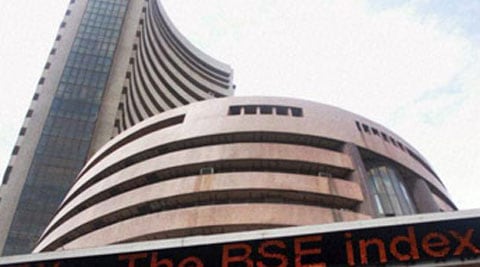Stay updated with the latest - Click here to follow us on Instagram
Plunging oil, shaky Greece: BSE Sensex registers biggest fall in 16 months
The absolute fall of 854.86 points was the biggest in a day since July 6, 2009, when the index fell 869 points.
 BSE Sensex.
BSE Sensex.
Even as the falling price of crude oil is considered a silver lining for the Indian economy, the benchmark Sensex at the Bombay Stock Exchange fell by 3.1 per cent on Tuesday, its biggest fall since crude began to soften in June 2014. Hit by the cascading effect of falling equity markets that reacted to global growth concerns, the index fell the most in 16 months to close at 26,987.46 points.
The absolute fall of 854.86 points was the biggest in a day since July 6, 2009, when the index fell 869 points. On Tuesday, the broader Nifty at the National Stock Exchange fell 251 points (3 per cent) to close at 8,127.
As oil kept falling — Brent crude went under $ 53 per barrel, an over 50-per cent fall since June — and concerns mounted over Greece’s ability to remain part of the Eurozone should the anti-austerity Syriza come to power later this month, investors globally moved away from equities and into safer debt instruments.
In India, foreign institutional investors pulled out a net Rs 1,570 crore from equities, but the fall was cushioned by domestic institutional investors who pumped Rs 1,189 crore into the market. Indian markets, that have benefitted from large FII inflows over the last year, fell the most among major markets on Tuesday.
Experts said that while India could only gain from low crude prices, Brent going under $ 55 per barrel reflected a deficient demand, the result of a slowdown in global growth.

“If there is a global slowdown, India too will get impacted. There will be no tailwinds of global growth and foreign flows, and it will be more up to us to create growth generators,” said a former deputy governor of RBI.
“Falling oil prices can lead to annual savings of between $ 75 billion and $ 100 billion for the country,” Raamdeo Agrawal, joint MD of Motilal Oswal Financial Services, said.
Tuesday’s crash in Indian markets followed a sharp 331-point (1.86 per cent) decline in the Dow Jones Industrial Average on Monday. Weak openings of major Asian markets added to the pressure, which stayed until the end of the trading session, when European markets too traded in the red.
Experts said markets could remain volatile until oil prices and the concerns over Greece stabilised. The Vix index (that measures near-term volatility) at NSE jumped 23 per cent on Tuesday to hit 17.42. “While near-term volatility will prevail, investors should take this as an opportunity to invest for the long term,” Agrawal said.







